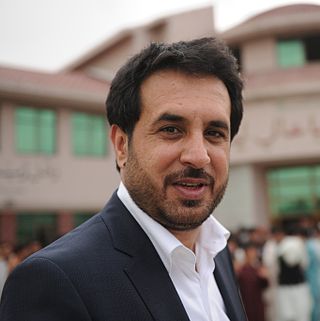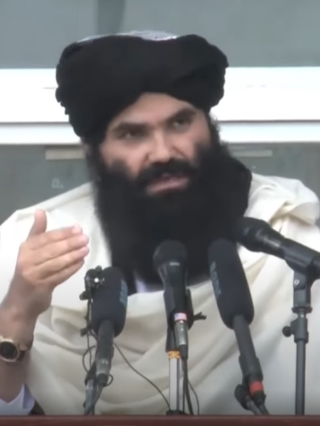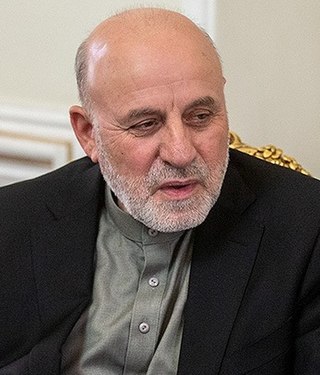Related Research Articles

Hamid Karzai is an Afghan politician who served as the fourth president of Afghanistan from July 2002 to September 2014, including as the first elected president of the Islamic Republic of Afghanistan from December 2004 to September 2014. He previously served as Chairman of the Afghan Interim Administration from December 2001 to July 2002. He is the chief (khān) of the Popalzai Durrani tribe of Pashtuns in Kandahar Province.

Gulbuddin Hekmatyar is an Afghan politician, former mujahideen leader and drug trafficker. He is the founder and current leader of the Hezb-e-Islami Gulbuddin political party, so called after Mohammad Yunus Khalis split from Hezbi Islami in 1979 to found Hezb-i Islami Khalis. He has twice served as Prime Minister during the 1990s.

Ahmed Wali Karzai was a politician in Afghanistan who served as Chairman of the Kandahar Provincial Council from 2005 until his death. He was the younger paternal half-brother of former Afghan President Hamid Karzai and an elder of the Popalzai tribe. Wali Karzai formerly lived in the United States, where he managed a restaurant owned by his family. He returned to Afghanistan following the removal of the Taliban government in late 2001. He has been accused of political corruption and was allegedly on the CIA payroll. He was assassinated by one of his close bodyguards, Sardar Mohammad, on 12 July 2011.
Though Afghanistan has had democratic elections throughout the 20th century, the electoral institutions have varied as changes in the political regime have disrupted political continuity. Elections were last held under the Islamic Republic of Afghanistan, which was deposed by the Taliban in August 2021. The Taliban dissolved the Elections Commission in December 2021. In May 2022, when asked if the Taliban would hold elections, First Deputy Leader Sirajuddin Haqqani said the question was "premature".

Mullah Mohammad Fazl is the First Deputy Defense Minister of the Islamic Emirate of Afghanistan, having assumed the role on 7 September 2021. He also served in the position during the previous Taliban government (1996–2001).

Khairullah Said Wali Khairkhwa is the Afghan Minister of Information and Culture and a former Minister of the Interior. After the fall of the Taliban government in 2001, he was held at the United States Guantanamo Bay detainment camp in Cuba for 12 years. He was released in late May 2014 in a prisoner exchange that involved Bowe Bergdahl and the Taliban five. Press reports have referred to him as "Mullah" and "Maulavi", two different honorifics for referring to senior Muslim clerics.

Abdul Haq was an Afghan mujahideen commander who fought against the Soviet-backed People's Democratic Party of Afghanistan, the de facto Afghan government in the 1980s. He was killed by the Taliban in October 2001 while trying to create a popular uprising against the Taliban in Afghanistan in the wake of the September 11th attacks.

Abdul Haq Wasiq is the Director of Intelligence of the Islamic Emirate of Afghanistan since September 7, 2021. He was previously the Deputy Minister of Intelligence in the former Taliban government (1996–2001). He was held in extrajudicial detention in the Guantanamo Bay detainment camps, in Cuba, from 2002 to 2014. His Guantanamo Internment Serial Number was 4. American intelligence analysts estimate that he was born in 1971 in Ghazni Province, Afghanistan.
Hammdidullah, a.k.a.Janat Gul, is a citizen of Afghanistan who was held in extrajudicial detention in the Guantanamo Bay detention camps as part of the War on Terror. American counter-terror analysts estimate he was born in 1973, in Sarpolad, Afghanistan.

Jalaluddin Haqqani was an Afghan insurgent commander who founded the Haqqani network, an insurgent group fighting in guerilla warfare against US-led NATO forces and the now former government of Afghanistan they support.

Asadullah Khalid is a politician in Afghanistan. He served as head of the National Directorate of Security (NDS), which is the domestic intelligence agency of Afghanistan. Before his appointment as the head of the NDS in September 2012, Khalid served as the Minister of Tribal and Border Affairs. Between 2005 and 2008, he was the Governor of Kandahar Province and prior to that as Governor of Ghazni Province (2002-2005). From 2018 until 2021 he was the Minister of Defense. Khalid is said to be affiliated with the Islamic Dawah Organisation of Afghanistan and has been noted as one of many loyalists of Afghan President Hamid Karzai.

Sirajuddin Haqqani is an Afghan warlord who is the first deputy leader of Afghanistan and the acting interior minister. He has been a deputy leader of the Taliban since 2015, and was additionally appointed to his ministerial role after the Taliban's victory over Western-backed forces in the 2001–2021 war. He has led the Haqqani network, a semi-autonomous paramilitary arm of the Taliban, since inheriting it from his father in 2018, and has primarily had military responsibilities within the Taliban.

The Haqqani network is an Afghan Islamist group, built around the family of the same name, that has used asymmetric warfare in Afghanistan to fight against Soviet forces in the 1980s, and US-led NATO forces and the Islamic Republic of Afghanistan government in the 21st century. It is recognized as a terrorist organization by the United Nations. It is considered to be a "semi-autonomous" offshoot of the Taliban. It has been most active in eastern Afghanistan and across the border in north-west Pakistan.

Mohammad Umer Daudzai is a politician in Afghanistan, most recently having served as President Ashraf Ghani's Special Envoy for Regional Consensus Building on Peace and as Head of the High Peace Council (HPC) Secretariat for a few months, until he was appointed as President Ghani's Campaign Manager for the 2019 Presidential elections. After a career with international non-governmental organizations including the United Nations Development Program in Geneva, Daudzai started work as two term Chief of Staff of Afghan President Hamid Karzai from 2003 to 2005 and then from 2007 to around 2010. From 2005 until 2007, President Karzai appointed him as Afghan Ambassador in Iran. He then served as the Afghan Ambassador to Pakistan, tasked with advancing efforts to reach a political solution to the war in Afghanistan. In September 2013, Daudzai was asked to serve as Afghan Minister of Interior in Kabul and ensure security for the challenging 2014 presidential elections.

Abdullah Abdullah is an Afghan politician who led the High Council for National Reconciliation (HCNR) from May 2020 until August 2021, when the Afghan government was overthrown by the Taliban. The council had been established to facilitate peace talks between the Islamic Republic of Afghanistan and the Taliban insurgents. Abdullah served as the Chief Executive of Afghanistan from September 2014 to March 2020, and as Minister of Foreign Affairs from December 2001 to April 2005. Prior to that, he was a senior member of the Northern Alliance, working as an adviser to Ahmad Shah Massoud. He worked as an ophthalmologist and medical doctor in the 1980s.

Hamid Karzai, the 12th President of Afghanistan, was subject to several failed assassination attempts after becoming leader of Afghanistan on 20 December 2001.
Events from the year 2011 in Afghanistan.
Engineer Ibrahim Spinzada is a politician in Afghanistan who has been appointed to several government positions by President Hamid Karzai. In 2004 the Los Angeles Times described Spinzada as Karzai's brother-in-law. The Congressional Research Service also called him "a Karzai brother-in-law", when it reported he was the first deputy adviser on Afghanistan's National Security Council in 2010.

The Inter-Services Intelligence (ISI) intelligence agency of Pakistan has been accused of being heavily involved in covertly running military intelligence programs in Afghanistan since before the Soviet invasion of Afghanistan in 1979. The first ISI operation in Afghanistan took place in 1975. It was in "retaliation to Republic of Afghanistan's proxy war and support to the militants against Pakistan". Before 1975, ISI did not conduct any operation in Afghanistan and it was only after decade of Republic of Afghanistan's proxy war against Pakistan, support to militants and armed incursion in 1960 and 1961 in Bajaur that Pakistan was forced to retaliate. Later on, in the 1980s, the ISI in Operation Cyclone systematically coordinated the distribution of arms and financial means provided by the United States Central Intelligence Agency (CIA) to factions of the Afghan mujahideen such as the Hezb-e Islami (HeI) of Gulbuddin Hekmatyar and the forces of Ahmad Shah Massoud whose forces would later be known as the Northern Alliance. After the Soviet retreat, the different Mujahideen factions turned on each other and were unable to come to a power sharing deal which resulted in a civil war. The United States, along with the ISI and the Pakistani government of Prime Minister Benazir Bhutto became the primary source of support for Hekmatyar in his 1992–1994 bombardment campaign against the Islamic State of Afghanistan and the capital Kabul.

Presidential elections were held in Afghanistan on 5 April 2014, with a second round held on 14 June. Incumbent President Hamid Karzai was not eligible to run due to term limits. The registration period for presidential nominations was open from 16 September 2013 until 6 October 2013. A total of 27 candidates were confirmed to be running for office. However, on 22 October Afghanistan's Independent Election Commission disqualified 16 of the candidates, leaving only 11 in the race. By April 2014 three candidates gave up the race and decided to support some of the eight remaining candidates. Opinion polls showed Abdullah Abdullah and Ashraf Ghani as the front-runners and indeed the results of the first round of the election had Abdullah in the lead and Ghani behind him. The second set of results came after the run-off on 14 June, two months after the first round. Preliminary results were expected on 2 July and the final result on 22 July. However, widespread accusations of fraud delayed these results. As a result, John Kerry, then United States Secretary of State, mediated the negotiations between the two final candidates, Ghani and Abdullah. After a series of negotiations and talks between Ghani, Abdullah and Kerry, the two candidates agreed to sign an Agreement to form a National Unity Government based on 50–50 power sharing. As a result of that political agreement, a separate position was created for Abdullah as Chief Executive. The National Unity Government's term ran out after the next Afghan presidential election was held in September 2019.
References
- 1 2 "Decisive push on al-Qaeda caves approaching". USA Today. 2002-03-11. Retrieved 2009-06-08.
- 1 2 "Afghan power brokers: Playing the tribal loyalty card". Christian Science Monitor. 2002-06-10. Archived from the original on 2008-03-02. Retrieved 2009-06-08.
- ↑ Swati Shara (2014-12-09). "List of the 119 prisoners detained in CIA's secret prisons program". Boston Globe . Retrieved 2014-12-11.